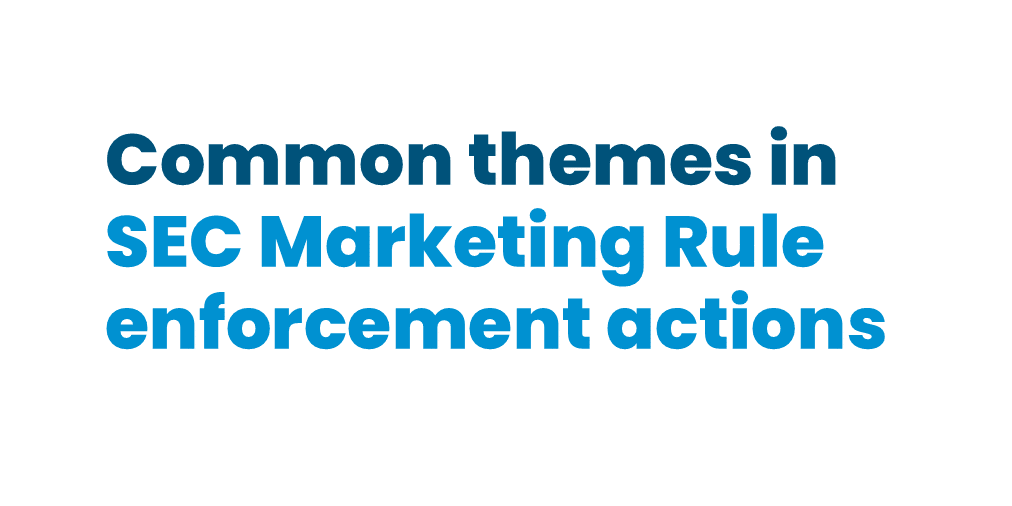
SEC Marketing Rule—What is an advertisement?
We’re coming up on two years since the SEC began enforcing its new Investment Advisor Marketing Rule in November 2022. When we first reviewed the rule, we noted the need for advisory firm marketers to think carefully about what is—and isn’t—an “advertisement” as now defined. In our work, for example, the question may arise with respect to news releases, media interview and content of various types. More recently, several firms have faced SEC enforcement actions that relate to this concept.
How the SEC Marketing Rule defines “advertisement”
Now, “advertisement” is defined with two distinct prongs, as summarized by the SEC in a news release about the Marketing Rule at the time of its introduction:
- First, the definition includes any direct or indirect communication an investment adviser makes that: (i) offers the investment adviser’s investment advisory services with regard to securities to prospective clients or private fund investors, or (ii) offers new investment advisory services with regard to securities to current clients or private fund investors. The first prong of the definition excludes most one-on-one communications and contains certain other exclusions.
- Second, the definition generally includes any endorsement or testimonial for which an adviser provides cash and non-cash compensation directly or indirectly (e.g., directed brokerage, awards or other prizes, and reduced advisory fees).
So, as we said at the time, RIAs need to be highly conscious of when they are “offering” their services with respect to securities advice. In the Federal Register entry for the Marketing Rule, the SEC offers this example to help illustrate the concept of “offering” services:
…a communication that simply notes that an event is “brought to you by XYZ Advisers” would not qualify as an advertisement, as it is not offering any advisory services with regard to securities.
Similarly, there’s discussion about how offering non-securities-related services isn’t governed by the Marketing rule. For example, advertisements for financial planning services with no mention of investment advisory services might not fall under the rule.
Common themes in enforcement actions of the Marketing Rule
More than a dozen firms have faced enforcement actions that deal, at least in part, with whether a particular communication is an “advertisement” and should, therefore, have not been communicated or at least disclosed differently. Enforcement has focused on disseminating hypothetical performance data without proper disclosures or policies—having failed to classify and handle these communications as advertisements.
Other enforcements have zeroed in on disclosures to advertisements and lack of policies and procedures designed to ensure that advertisements, especially those with hypothetical performance data, were relevant and not misleading to the intended audience.
Advisory firms should take particular care to ensure any performance data is relevant to the likely financial situation and investment objectives of the audience. (Of course, please turn to compliance professionals and legal counsel for specific guidance.)
Summary table: What is an advertisement under the Marketing Rule?
Of course, not all advertisements involve performance. Following is a table we’ve constructed to help marketing professionals zero in on what the Marketing Rule considers an advertisement and what it doesn’t. We hope you find this a helpful reference; again, we respectfully point you to compliance and legal professionals for specific guidance and additional nuance.
| wdt_ID | Communication Type | Advertisement? | Explanation |
|---|---|---|---|
| 1 | Direct Communication Offering Advisory Services | Yes | Any direct or indirect communication offering investment advisory services to prospective or current clients is considered an advertisement. |
| 2 | One-on-One Communications | No, generally | Excluded from the definition of advertisement, except when offering new advisory services to existing clients. |
| 4 | Endorsements/Testimonials with Compensation | Yes | Any endorsement or testimonial for which the adviser provides compensation, including non-cash compensation like awards or reduced fees. |
| 6 | Market Commentary (Generic/Educational) | No, generally | Market commentary, educational material, and generic brand content are not considered advertisements unless they veer into offering advisory services. |
| 8 | Media Interviews (General Market Commentary) | No, generally | Media interviews providing general market commentary are not advertisements unless they discuss the firm’s securities-related services. |
| 10 | Webcasts/In-Person Events (Live, Oral) | No, for extemporaneous live oral communications | Prepared presentations with content offering securities-related services are considered advertisements. |
| 12 | Social Media (User-Generated Content) | No, generally | Content posted by third parties is not considered advertising unless manipulated by the firm (e.g., deleting unfavorable comments, endorsing comments). |
| 14 | Financial Planning Services (Non-Securities) | No, generally | Advertisements for non-securities-related services, such as financial planning without mention of investment advisory services, are not governed by the new Marketing rule. |
| 16 | Event Sponsorship Mentions | No | Statements such as “brought to you by XYZ Advisers” do not qualify as advertisements as they do not offer advisory services with regard to securities. |
| 18 | Articles/White Papers (Generic Content) | No, generally | Articles or white papers providing general market commentary are not advertisements unless they conclude with a description of how the adviser’s services can help prospective clients. |
Subscribe.
Receive the latest news and insights from Lowe Group.